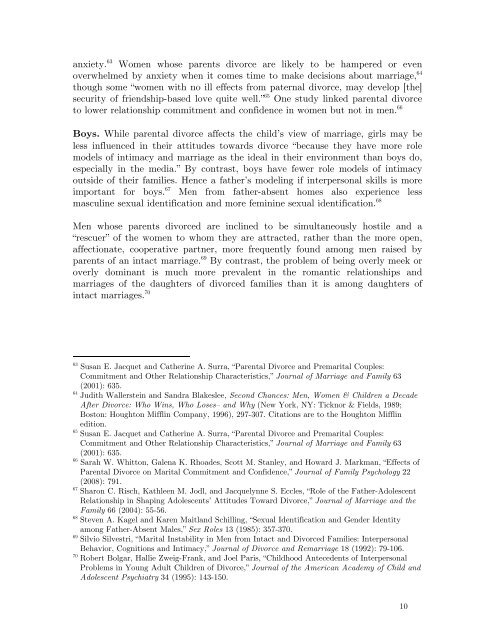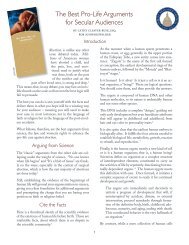The Effects of Divorce on Children - Family Research Council
The Effects of Divorce on Children - Family Research Council
The Effects of Divorce on Children - Family Research Council
Create successful ePaper yourself
Turn your PDF publications into a flip-book with our unique Google optimized e-Paper software.
anxiety. 63 Women whose parents divorce are likely to be hampered or even<br />
overwhelmed by anxiety when it comes time to make decisi<strong>on</strong>s about marriage, 64<br />
though some “women with no ill effects from paternal divorce, may develop [the]<br />
security <str<strong>on</strong>g>of</str<strong>on</strong>g> friendship-based love quite well.” 65 One study linked parental divorce<br />
to lower relati<strong>on</strong>ship commitment and c<strong>on</strong>fidence in women but not in men. 66<br />
Boys. While parental divorce affects the child’s view <str<strong>on</strong>g>of</str<strong>on</strong>g> marriage, girls may be<br />
less influenced in their attitudes towards divorce “because they have more role<br />
models <str<strong>on</strong>g>of</str<strong>on</strong>g> intimacy and marriage as the ideal in their envir<strong>on</strong>ment than boys do,<br />
especially in the media.” By c<strong>on</strong>trast, boys have fewer role models <str<strong>on</strong>g>of</str<strong>on</strong>g> intimacy<br />
outside <str<strong>on</strong>g>of</str<strong>on</strong>g> their families. Hence a father’s modeling if interpers<strong>on</strong>al skills is more<br />
important for boys. 67 Men from father-absent homes also experience less<br />
masculine sexual identificati<strong>on</strong> and more feminine sexual identificati<strong>on</strong>. 68<br />
Men whose parents divorced are inclined to be simultaneously hostile and a<br />
“rescuer” <str<strong>on</strong>g>of</str<strong>on</strong>g> the women to whom they are attracted, rather than the more open,<br />
affecti<strong>on</strong>ate, cooperative partner, more frequently found am<strong>on</strong>g men raised by<br />
parents <str<strong>on</strong>g>of</str<strong>on</strong>g> an intact marriage. 69 By c<strong>on</strong>trast, the problem <str<strong>on</strong>g>of</str<strong>on</strong>g> being overly meek or<br />
overly dominant is much more prevalent in the romantic relati<strong>on</strong>ships and<br />
marriages <str<strong>on</strong>g>of</str<strong>on</strong>g> the daughters <str<strong>on</strong>g>of</str<strong>on</strong>g> divorced families than it is am<strong>on</strong>g daughters <str<strong>on</strong>g>of</str<strong>on</strong>g><br />
intact marriages. 70<br />
63 Susan E. Jacquet and Catherine A. Surra, “Parental <str<strong>on</strong>g>Divorce</str<strong>on</strong>g> and Premarital Couples:<br />
Commitment and Other Relati<strong>on</strong>ship Characteristics,” Journal <str<strong>on</strong>g>of</str<strong>on</strong>g> Marriage and <strong>Family</strong> 63<br />
(2001): 635.<br />
64 Judith Wallerstein and Sandra Blakeslee, Sec<strong>on</strong>d Chances: Men, Women & <strong>Children</strong> a Decade<br />
After <str<strong>on</strong>g>Divorce</str<strong>on</strong>g>: Who Wins, Who Loses– and Why (New York, NY: Ticknor & Fields, 1989;<br />
Bost<strong>on</strong>: Hought<strong>on</strong> Mifflin Company, 1996), 297-307. Citati<strong>on</strong>s are to the Hought<strong>on</strong> Mifflin<br />
editi<strong>on</strong>.<br />
65 Susan E. Jacquet and Catherine A. Surra, “Parental <str<strong>on</strong>g>Divorce</str<strong>on</strong>g> and Premarital Couples:<br />
Commitment and Other Relati<strong>on</strong>ship Characteristics,” Journal <str<strong>on</strong>g>of</str<strong>on</strong>g> Marriage and <strong>Family</strong> 63<br />
(2001): 635.<br />
66 Sarah W. Whitt<strong>on</strong>, Galena K. Rhoades, Scott M. Stanley, and Howard J. Markman, “<str<strong>on</strong>g>Effects</str<strong>on</strong>g> <str<strong>on</strong>g>of</str<strong>on</strong>g><br />
Parental <str<strong>on</strong>g>Divorce</str<strong>on</strong>g> <strong>on</strong> Marital Commitment and C<strong>on</strong>fidence,” Journal <str<strong>on</strong>g>of</str<strong>on</strong>g> <strong>Family</strong> Psychology 22<br />
(2008): 791.<br />
67 Shar<strong>on</strong> C. Risch, Kathleen M. Jodl, and Jacquelynne S. Eccles, “Role <str<strong>on</strong>g>of</str<strong>on</strong>g> the Father-Adolescent<br />
Relati<strong>on</strong>ship in Shaping Adolescents’ Attitudes Toward <str<strong>on</strong>g>Divorce</str<strong>on</strong>g>,” Journal <str<strong>on</strong>g>of</str<strong>on</strong>g> Marriage and the<br />
<strong>Family</strong> 66 (2004): 55-56.<br />
68 Steven A. Kagel and Karen Maitland Schilling, “Sexual Identificati<strong>on</strong> and Gender Identity<br />
am<strong>on</strong>g Father-Absent Males,” Sex Roles 13 (1985): 357-370.<br />
69 Silvio Silvestri, “Marital Instability in Men from Intact and <str<strong>on</strong>g>Divorce</str<strong>on</strong>g>d Families: Interpers<strong>on</strong>al<br />
Behavior, Cogniti<strong>on</strong>s and Intimacy,” Journal <str<strong>on</strong>g>of</str<strong>on</strong>g> <str<strong>on</strong>g>Divorce</str<strong>on</strong>g> and Remarriage 18 (1992): 79-106.<br />
70 Robert Bolgar, Hallie Zweig-Frank, and Joel Paris, “Childhood Antecedents <str<strong>on</strong>g>of</str<strong>on</strong>g> Interpers<strong>on</strong>al<br />
Problems in Young Adult <strong>Children</strong> <str<strong>on</strong>g>of</str<strong>on</strong>g> <str<strong>on</strong>g>Divorce</str<strong>on</strong>g>,” Journal <str<strong>on</strong>g>of</str<strong>on</strong>g> the American Academy <str<strong>on</strong>g>of</str<strong>on</strong>g> Child and<br />
Adolescent Psychiatry 34 (1995): 143-150.<br />
10




